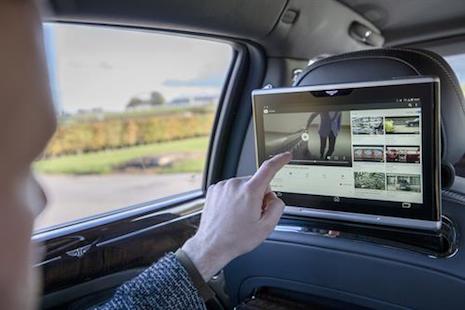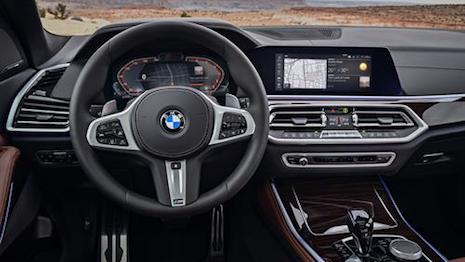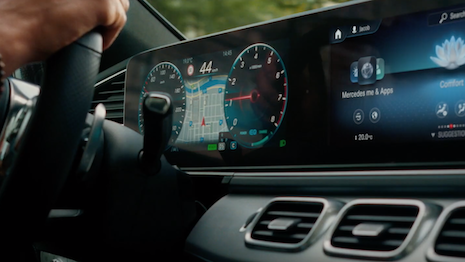As luxury automakers continue investing in vehicle technology, companies risk alienating a significant number of affluents who believe these innovations detract from the driving experience.
According to a YouGov report on affluent auto purchasers, part of the YouGov Affluent Perspective 2019, U.S. drivers are interested in technology that enhances vehicles’ safety, security and convenience. Vehicle technology is quickly becoming a key factor in purchasing decisions, along with design, safety, comfort and price.
“Safety is of the utmost importance to affluent drivers,” said Cara David, managing partner at YouGov, New York. “Drivers look for technology that works to keep them, and others, safe.”
Driving technology
Almost half of affluents, 45 percent, believe that vehicle technology has overwhelmed the driving experience. Drivers are often drawn to luxury vehicles because of their performance capabilities.
Drivers who are interested in car technology want features that make vehicles safer or make driving more convenient.

Luxury automakers have embraced connectivity. Image credit: Bentley
Override features are the most desired technology that improves safety, with 68 percent of affluents showing interest in driver override systems. This often includes the ability for cars to self-brake or correct steering.
Similarly, 63 percent are interested in remote vehicle shutdown capabilities.
More than half of drivers, 58 percent, want active window displays incorporated into their vehicles.
Technology that improves convenience is also appealing to affluents.
Sixty-six percent of respondents want connected mobile applications. This would allow drivers to control car features through their smartphones and other mobile devices.
“The smartphone has become more than just a phone – it is a central hub in the lives of consumers,” Ms. David said. “As these devices are increasingly being used to coordinate our schedules, organize our media and control home features, it only makes sense that cars should be next on the list.”

BMW smart cockpit. Image credit: BMW
About one in two drivers, 53 percent, desire biometric vehicle access.
Biometrics have other applications in the auto industry.
Following research, British automaker Jaguar Land Rover has developed an algorithm that can assess a rider’s wellness based on biometric data. When combined with driving data, the car will be able to tell when a rider is feeling ill (see story).
Looking ahead
Luxury carmakers have already been developing technology to meet consumer demands and make driving safer and more comfortable.
Insights from Frost & Sullivan suggest that a new business model will emerge for the luxury automotive industry, focusing on data, connectivity, customer centricity and cyber security. Electric vehicles, new mobility services, multi-modality, artificial intelligence and autonomous vehicles will be the center of investment, not just from luxury brands as they stand, but standard and all companies as well (see story).
German automaker Mercedes-Benz is adapting to modern driving behaviors and vehicle purchasing habits with a new feature it is positioning to appeal to all types of drivers.
Mercedes will be allowing new A-Class owners to seamlessly share their vehicles with individuals of their choice through its application. The feature allows users to share their vehicle with only the group of people of their choice and opts for heightened security measures (see story).
The range of digital services Mercedes offers as part of its Mercedes me application and program will now be extended to older models. Through an adapter, older models will be able to receive connected information similar to new models (see story).
“Technology should be integrated as seamlessly as possible,” YouGov’s Ms. David said.
{"ct":"QlwClQo6IHJElDLnhvvtEWUUeDHkGuupwlxU6jfiiu+Eo7+PKzdbae8itD4q3+lCFZgzzhPV35BjazeY\/PhVeRwSmtQEwrO\/85XwrVt2XkVVI3SktEPwgMrOv6gaIJ7OVC5kyWFvUQZUAa5yyEYV6BeLPfoGhzPrJLu4L3MI0JQcllPRpx2VUF7HfEXPXCtABTNoTzSpxOAj\/l8eSSkfWOUYH7BrIvF5udvHd38H8gPpuZ8\/RJIMMQEwZlMVM21jGeigCBSNMQnumcYqLrTZsPR1lyKFgDoJb8nQATsZxM2TaM0Ju5x3Rhy0WiSJxQiwR7tcg9GIJkXWwHjsMJYZmhg4wZrm8jWf+kya\/efsxHSvhGwKbOXN6NHa2S1HwnF5KaSawCGg9xJGcuria5by2oST9vQPg9wAzOaHjZvw0x7MYX20lxY1XmcZIS+5wzUszKPBT8oh4beY8ry\/kudyQFQagzwYm4UKU2BVcERH7MS156Jpv5+nKvtNZS4wRel8E2nIrl0O1Lz5wP5wX+I+SskxyO0c6raLEmAOECFY4rJO8K3iE\/FpeB+5W+x5JSfGORFQiIUH7RVMxf45xAdyKhmXMe\/7z6lQk6\/vfeh\/jpmBts4awuGrp8zvp7IJfd0GW3kEMCuaVvecBN5inMGovhbzbHg0JbqCLtfCF+cuM64PzgdWG9UMTiEi9uJ\/ji9lRZDIjQW4DQd7ZVXJqM\/hVD4CDnpp7w5QcE46Vz4++WGJ9tXstYkPxndgMBTldT0CsW3HwjaWYDz6C75JXkPleZ1u0apciv2L192bqCE+qcJ1eMcTBH415XhAb42sMhn9awaraO1FHbHEdG0fNY0sDizcVVb+f50uKgc804BpV9am4jy7pANyuLZ7rBE3JhH+gtlVuB7\/rQ\/L1adPY9AXppGoH6gbMcDCQ5UUtiu7KQliMQfwpTcaP+ssqc7bpRp08dwgqjoBOPemxXR8ejwBH4eqsC6r17T4PzrYzkvthuItpJGNU+0FsqNs5UIhrJMJ1U9pikIB\/GPY1pWUU4CLNmQwO5t79LRRAvdGED\/MiJm4hYRdfq+xyMuFM1FYZbt5tUcmZHRBIMN45go+HI11S6Q7RiC0OsZ64+rqTRtKT4P6uqClQtQdXIheMZ6meDeG5c3YoiONmWEOvZlvasZlqwqpSvalddKQfuRftHlRS56TYsZ6poAbV2QIh0L8gPHyu8RanrHdpTNvbYhXuH7rFq5NorbnSMLH08c\/Kz1Sq6HUk8XYJKnQ\/ltrTkZvOls7PK2lsEjC5aP\/lng9d5fO0o7MtFaeCzNNTTVdcMlSm3re3Ck\/YHW7FVsVnSMjuRpKeYFtKQy\/3jJy5LP+T6NBSeNKL4rZn3MMWzTKme26QhMmuetUoYSQD2r\/uOaQ+nz1qkNy++HuJeZgU8H6tFgWQr1Ku4X8qpj2v6Z9yxtO3oPrqnh3clr12ozJIWaCwu26l4ISyqvsNDB+AMdhTz9EklkXGroPnakYFmPBer0rsiyBLHnucB8dxkINrlAjarYSgK40IVmH2xknFOqAdtFtgYhCcz34dlwADKda+GB2vCizW\/UaU3HkQKFjVnB5kysMi\/T6Pr1cvDOLQ7SziyIqwhrStibhkZtp24O+j5Bz2\/aT3eGU+4KrzNPxajp9ao624N7nrM9SYjL6nubROmp2KpU+gaOKYqFKALG6Ss6YtMw4dSlKwFX3YkAumbZtBMDjlxpyuiv0SLw64uN8stK94WtAwB3xGLH7bD4eoEmAS+qHGQF3WyoQKXhTsMcxQEG3l4Y2jgq2AeI7\/6BG7SHBK4FtwQmup\/67Olzww9oO24NirYjw3nDUk2PpfEvLK4sjpJxLC24l478q414A4NjtEeND69XHVoAOTAogterIpO1olKE\/ZDpGHeFFIBaveUwC9Y9wc66mA\/mXiy19UhOBf45lg82XVkOsiiDkXJBIsxFAZyaixoZl+Wk2P7AlwPsDMWRrah+vqg381cuShmUVZvp1kIj0NYRxSgobn3F8R0DrGsdRSwN6+y\/ZEMdE7OsFjHT3xk7+z2a5rfYCOU\/B9U\/3PZ5CfSLVfPcdWNRexvgy9zKXDCK3W4zI+7bjFylZ7mgBgRP4qsDj8+XRrOnHtbcxNPeFO4QelFvoBrXm7vEZiyLtKBjCUhuVTP+fMrMaqa8BN6gp460KXLuNiwHSwo24A+G5fNPGqeGUOBO3sHjBPm4wcazLSYvKhwrdAHGj0aXdYSJCgze3lcpOZTKXlOerSIy6hQYrgrUDNJJZ\/WPrG7PWFov8N0RzhNaqL6Ueg2m3\/O95HPWXLa1OwkDIT7mUXNP4WoIarYxvC5TsEfAHJj902Cyjw5otGWd2+ZKNee37pA\/cndJyVePDAcFVDnZJbLA1ZRLwYNrseJcRtBnRX+O1rrZPMM4T6OKLmMswWZus5hzw8kD+gL3n0Q01EkH4wETOUIOx2uWzS1051VLXevbzKsG+sfpCOj\/5Ic978SLTlYl8kw2QJZGuQIon4YlVwtzWBi5sQ2fAtwJ3ocrRt3X6+rMPDgrWuVv+zNjGFz6a0U\/4q\/YC\/LLHeOZaXgchzPxuUa9HHV3YS4KNLKXDw6qIz58bkI71HqV6hGPX3xjLC1QTupn79UUN6wsgrI\/AzGyatn4iRbgGuqCVe\/32bZW1NKS3lapnG+AjZYbEWf+jFJCs6xUkcLTtj1\/rwfJnIVrskUvF\/itfs5WfgjjHHGUxSkOnYji6ogCqt3NCDMXsg\/Sq938zsXtPQ4csjihGAGXblUX11dphIm058YH4sX93EFHPXmC3x\/VUxDho98KVN+aS9Wuo\/StnRjWod7dddaVghZyobijZJI02LjCXWNHKqTHMr7PWWWMrx+4l+0WLjrYohNrpNEuxX45sn0WoNxRVIbLZ9oeWSiLwYC1nb5fA3YPNYBFQz0n+FOMYCDkKMJ2lpiLZrj7ysBdXb9BjW2WNnAixTLXn6KYhWQh6+0aFxL1fNirlDGHmHuZmDfKXAJ7oG39sbGpSAQTHCm\/WUyhYq6M+JX7GS0ziKNseauP3cXS\/NytjVmdws6szK7sRzLd+JIONLxfLiuz69l1qLrdtBGeXyyHrFqxUUdtjDw3XCgYQhPxvZ\/K9dqqMnK04IoxJwU3Nhb5B4j7IQnpsu\/UrYE6Yk8x2prUiTZBck6h9V8AVHwGbvUWUnql1cFl2DHBULvT4cCZl7xplOcMg961uVZcykV0NrHvGYHtJ12IhwmYlkqTUiaCjyk1q5heHgpPxpy\/\/hp6H+0Tf4QpVH\/jQhICRNigP1jYozlflxhFu4daZHATRLTuWU\/5bcaxNQwre08T2QpUAqmfGBiETimUU6W8E8WzJoQR4B2s4O2TPgw2\/NqbMXoNm3K7DVimOR8bVTpPMHQtNsicx6y\/himCAx8tZJRtdDXIiAuG1NLz5pNVTCBqfltIpF6uo9m1jmCSsd0yJ3\/4MmXvSZfXM54XL2l8zJncejfxqQTlr2n29iyTsRo4G+EechGy\/NQwrAhQROBar3uchLUMf1mMqz\/Cptj7enAx41d1sw0hxa9sqZta8pgQS4wngbiHlrEyrGIRZuxn9BlcUavwUnE0EsuhOjZtFpmZODAX6WZx4bDjcgtf0DlMi2H0vpyWvQoZDYQ73RU0oDv3xWebuBsy18meDKNvf0uxEkuRfV2utzhi+VqeYl3uvzYXN\/QHIxzpNSTBVZmabGSGttKTXB0wWR45RutOqHGZJc17\/bAaQCdTJsvnTz+Y7h2jtheW+5x\/SpMOzOH9OE3596XPOOxDLKeuDXqJc2u4cVPGtedws\/Mxj+9tMvXeJbxWVwUV7VLgOYDRGq7nGVBdD+lQQlpKZBIzu1uVeCWjhteIEVTkJ2L9D29K0m4yE6bvR5HH0DM9395xQmunYMh6Sf5kMunKa\/dUjaoP5HLwA+zQtUnnExBAm7wWOPM7aUrmPUJEr9JsQtOvYjaUp0kYxY07MUAzApgkDVZwOlnK07A3v9N3In1iVZfGK3NTC2rnGIO7ao8HyEyZzRHQdkOEV4Yn9sVPYDnzsY1wR4GHoQyl3I5QvYEfBO4vic3pAEMZIbFa\/OpgS9y5uPV8lfB3HT8HNQqIfLL+dUdpb7f+ExXrYqTA\/l5y\/5DYcGnEo1PADTPNHSlsL+zkdd7Dg4TBaa55KU2\/MVasfmQ4bhHGl90CCgJfNOAAh7dCyZChr8zSjUa6zF6T8LUX7UmeAUWPUG7rX054LjQk4NEbnU1SJW7tm75TVg5FsXzd1\/MJQm7EKmsgUylpQNATSApOBx1uOS1ymtUha0Tf35yRfWEhO2wCuTpoNvTkAI6jBQoR5KaimiibwTf8ow7GGcr9aK52axiRs55T0C6JUm2LCTUmMWl88qiCqIzjlFd10eEXuavnxdKKPn9iYDatDKFDrZLSoF7kfuxk5\/uzmjTeRbzd9Vb\/6XSgHuh5diRTtexxnUkvf53yyK3l6wIZoQ9BBuQQHBiF36TZaN1oBeUdLAmAMS8fEL4oEmTnINVXwd7dKlM4hwShVuTgzcsLwXLem5AU6IQ8I0wNq60vdUaGdgqC8RetnLww2kjLxhVG8Z5iuP+i3wMcurLVg34uEDldPVRdd2cyx07Tto6I4UN0dpWEKlqsJ3wRVExMkEDm39L3v8c3ZjpVc4ASEwvAKw1RSTTUjtM+7YyUeSIAZk139JQn23hdHd76x9mZja\/rN3Z1CZByoRVBHUHgj7c0msSapY4G6wNlBcwe1rrbdcmMJJACYVWBT0je3dkj+Cox6UKKYkeZSf72Or1OTc2LmaKCBE9EBFsxuDJLmGHCdrJ6D8BJCB0dXLKavHWR9mIJTqo18xYylfcmyKz2eNelPcNFQWO2jIMWA2bYunZOiiAeIqjm7\/baheD+poccu5jAAiDfyNDshI5KHDJDCvVRN2c+kN7iz0nbEMcFJPxFz2I0Zqkpfmq3RUR6MfKvsa8pGu9IE+aZG+FiuPx3vXMHinNuX5dBdniXJZagxV+0bpKUJquqken1TIFvvW0LkJ1cTTDaS2ZfD18BUyCUQyQPuHqD0ByWV\/DFavUR25fYa7ypq4GulVOZP7Ni1R4PEh4q\/ZaxZkzljCjdQEQLpWU2NvcuOMfeT2MDCvKspf4tsQir6Hgi4orJv2EQ7i42zhXLSHZaQKhkp3qfs\/MZEwaleorI8NIT95+tphJWH+UjqUF4AyTJDud8exhXjYFvG2jlcRg+UNWes5UwJktLhsYdnpxP2PTFDG5ampmt3e1ooi60vPbPArp\/JBMQVke0q2dUxraQhew1SfeMEQ3pjrw5qsjn7c2tfV11L43DzWLxaX9WHW7oJ0txq44UmEnGOwHgLyREYbAb6365ZqgnEcTPxmZDhxce2Q+Rm3U5XVHaQ7I3r8+hIhHW3koFqG57gfF4P6+lPmX3vc+mXrE9mpvQBRKpiGELEv6QNZybr\/IRQ+uT6XI+T\/WSKQ0EwCwvXTeS2qHAe7I4vLG5\/EymkBGjvnpomV0jl\/wiUrBUVpabxXDJCZYfIGJbDLGWpZqnr9SMBJcs274IK0bcjVqBw8na1nStRVB1TnsuI5hkgsOEsF\/SxPJbcT6KQHRz9G8etZYr38ivUz0NHyJRE3ix\/KV+AsN5a45GOaJHyxFrxgD\/JbhWwrqCGFoj3lys0iEtIzeZjzLyfrbCEdpg5B3VWDjY8nTCIxwupGhAZvcJPoueOsrTYeBlok46dTkRCvY24huqV1BS4CWgm9AziAnzE6dLwpJePzksr7t8hVZNFPQFvFCfGo78n6R64B7144jrtS1ju10gBMdIfFbGUZoLt31C3ZT3w7kk9Vgex5nl9zXsXtaosiMtHwh3Ny77sZVhM0UorjlyAIqygDGvpObsknoeuqphRfJfNxOzGZTaeQOFym0AeaJ+EXFRgkD8GvK5TOyZ1dub\/kmgO2Clkp3\/j2i64tY+JM1gUce3zaZV\/pRJSpUtqRSdxSD8akcq8tMYJOjJy9UQI8SBGBe\/Ly\/XlxpTb0hj4nnZSkECA70SXSJkcCC6CwxTERbT3c7H7IkRxDpwcRkL1fgHYygj9Z+10Hy2L6cMVI6cm9iKkxVELBzuGBPG1pUq28dx0uMbNoEPb0uHpwCGdz7OqLJvZnEFnTUDAG+WabRRfB+J910YleytJL335GvFyoVvS74cDHHWlqUBnrh6a4BWD2y324H7Jl46aBuiSCDTuwiEjX9psm3WIKNa4nT\/J3KI045JHSGKmcUPPC9LahvvmNCjMpkM+3uoW8HKVAUF7nkD+b9M\/5gEc7CiGkGntCBaRr9gAnhAM\/xAYc09tbwvpiKPe8nIkA6M6h7LAc2mnBZs\/3loALQah1n25qchitvlKQ96JVx3YCrpBAfczVoZKQFuAWPHcW9d4JzOo2wsCYfDxgvBU4hGhq7BZxW5Xmcr2FYK6pKBDR9+AbO+pJFJSOPYgt41z8Eb3GL16+46zcuGj2gOWMV4GfwaUHRT9OdZs1zWv3WgtHamH\/rBl3Z7y4ixuII4xV4Nds1O0rNF2u0Q0wgyPq7lqsuUXB8roY9sivJEbi3FOWe6CM+h9GiSsu\/RAjBKI9l64JZi76JgQHUNjj1hwzc0ZVc4bDngMAKaF2fqfFCgsx+jfMXw9Q\/jDDwiKI765i8duDG8EX\/nSLWIOK5UpRlm6aDw1Mshrj5klChh9UAMCxUdSgugS9AkI6jsLTyQXxHzE8IG58prtmUNgiO3dRyldHdYg6sgEwsRbeGdosQtqONVHTjLj9hQEGg8GCXOFUIyr0MV0WMqC29K9I9jVo7S6X1ZeOFuf3GVFm8Q0mnZ8XtjXcWbWVCkWqfcATozCdfAlknPHoBcwqaw2Mn1NKLkLmNQwiWzjG8r8FLUuZ0UnOcX8t8opKuFHO5fuADPC1gXPk78jJbC4v68icOjSXEBbNe7SG4TinnmcF\/GV1YTT7sGIyjlb2ZqBqvjAuWyfzaceO3GHG6StBqNHj76MUh72mz2BddERADTrMfQJ2r2nV2RZPRuDi52xt7jvxDE0gzv5okzmYrH7uhtru4rVHrz4X8nHVSsXfq2qF5tFCiEJpfeAwh2jz3UYc5lhNaKMobSd9+wOSxdcPqTWVi8vwuUu29EoC5Yuur06sPq7cfScHCWWvBII1wVZPvHI77r8NyusLzwjk8tsx3yKVaEQigY6E7PTYCC7ptLfmcGkT97FHm9pRtnAh7klB1D7uKrqcBayHlEqyLaGf5J4N5DePIPEg2J9lBoCh4\/5\/8k=","iv":"0af6d702473eabbc48c48e450764306b","s":"a0becc3e0fd23a2d"}

 Voice technology is featured in many luxury vehicles. Image credit: Mercedes
Voice technology is featured in many luxury vehicles. Image credit: Mercedes